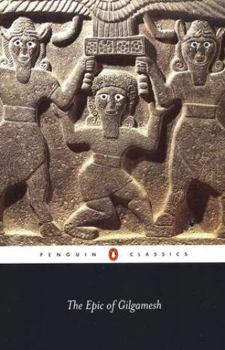The Epic of Gilgamesh
Select Format
Select Condition 
Book Overview
N. K. Sandars's landmark translation of one of the first and greatest works of Western literature A Penguin Classic
Gilgamesh, King of Uruk, and his companion Enkidu are the only heroes to have survived from the ancient literature of Babylon, immortalized in this epic poem that dates back to the third millennium BC. Together they journey to the Spring of Youth, defeat the Bull of Heaven and slay the monster Humbaba. When Enkidu...
Format:Paperback
Language:English
ISBN:014044100X
ISBN13:9780140441000
Release Date:December 1960
Publisher:Penguin Classics
Length:128 Pages
Weight:0.24 lbs.
Dimensions:0.3" x 5.0" x 7.7"
Age Range:18 years and up
Grade Range:Postsecondary and higher
Customer Reviews
2 ratings
A work of art!
Published by Thriftbooks.com User , 18 years ago
Translating poetry is a tricky thing. Some people maintain that it can't be done. I would say that the translator can set himself three possible goals. First, he can try to create a "trot," a plain, "literal" translation where every word of the original is explained. See Nabokov's "Eugene Onegin" for an example of this. Second, he can try "simply" to translate it, to give his reader a good idea of what is there on the page, the mood, and so forth. LOTS of translators do this. Third, and most elusive, most difficult, is to create a work of literary art IN ENGLISH (or whatever the target language is). Hopefully this third goal will automatically include all the most important elements of "mere translation." But, if the translator succeeeds, he will have created an independent work of art which will then take on a life of its own. The most famous example of this would probably be FitzGerald's "Ruba'iyat of Omar Khayyam," probably better described as a fantasy and variations on themes of Omar Khayyam. Alexander Pope's translation of Homer's "Iliad" surely has legs, still in print after all these years. David Ferry has attempted the third goal in his translation of "Gilgamesh," and to my mind he succeeds. The result is a moving and beautiful work of literary art, and I predict a very long life for it.
The first book ever written remains a treat
Published by Thriftbooks.com User , 22 years ago
Gilgamesh, the king of Uruk (and in real life he was the king of Uruk), is the first tragic hero recorded by the human race. Though many of the epic's tablets were discovered in Assurbanipal's Assyrian library (7th century B.C), parts of this book appear to originate from around 3000 B.C. Long before the Assyrians, 1800 years before the Hebrews, and, in fact, before anybody as this story originated with the hard-bitten people of Sumer, the first civilization, who happened to have been utterly lost from history until the 19th century A.D. The very civilization to invent the wheel, the city, the sexigesimal system governing the sweep of hands on your watch and, most importantly, writing. Say "alcohol", and you speak Sumerian - as they apparently invented that too, while the word has not changed for over 5000 years. "Hard-bitten" because while the Egyptians would celebrate Nile floods, Sumerians cursed themselves for having deserved such punishment as a flooded Tigris or Euphrates. To Egyptians the sun was life. To Sumerians the sun was relentless. Suffering is an excellent source of creativity (though the Egyptians did well with less) and Gilgamesh reflects this in both its creativity and diagnosis. Although very old, his story is forever new. Gilgamesh is - as stated in the introduction - emblematic of our concern with mortality, the struggle for knowledge and escape from the common lot of man. As a mortal, Gilgamesh is condemned to death, but he doesn't take his fate lying down. So, like all good mythologies, he sets out on a great adventure to rectify his problem, encountering gods, monsters and his best friend, Enkidu, the "savage man", who is at home with the animals, until enticed by the civilized Gilgamesh with a woman - something he never saw before. Perhaps a symbol of man's complications when leaving his natural state.Most interestingly Gilgamesh reaches "where the sun rises" to meet Upnapishtim. Upnapishtim is by now famous for saving "the seed of all living creatures" on a boat, whose dimensions are given by a rogue god friendly to man, all before a great worldwide flood sent by other capricious gods because humans were making too much noise, keeping the gods from sleep. (That Noah mimics the Upnapishtim myth should be no surprise as Sumer influenced the Levant for thousands of years after its passing.)When Enkidu dies Gilgamesh morns, "How can I rest when Enkidu, whom I love is dust and I too shall die and be laid in the earth forever." In the end Gilgamesh is "mocked by fate, lost opportunities, wasted hopes and swallowed by death". Apparently, no matter how many gods you have - and the Sumerians had hundreds, one even for the pick-axe - death remains a mystery and confidence of reward a hunch. A wonderful journey into the mind of humanities first civilization, greater understanding of scriptures to follow and a clear signal that the deepest concerns of our human condition remain unaltered no matter where or when.
The Epic of Gilgamesh Mentions in Our Blog

Divine Inspiration
Published by William Shelton • March 14, 2023
From the earliest moments of mankind, even until today, our species has been compelled to look up and ponder our origin. This instinct naturally leant itself to the origin of books and writing itself, with much of the written word produced by mankind having been devoted to recording our beliefs.






